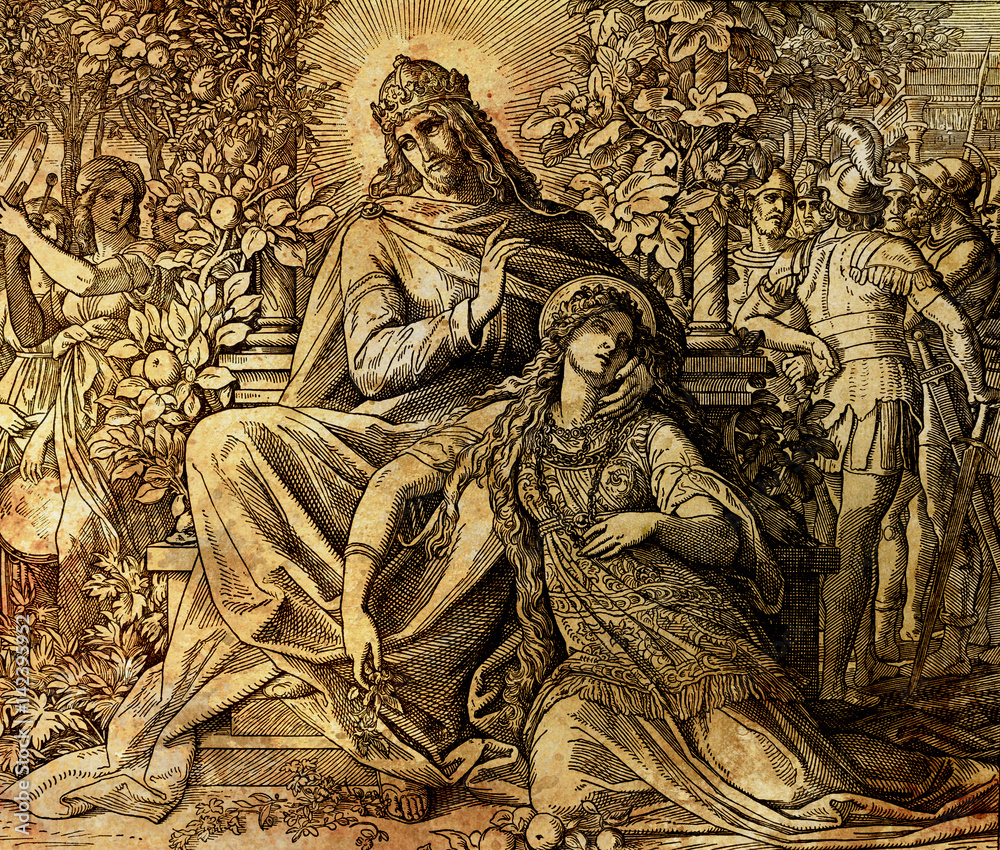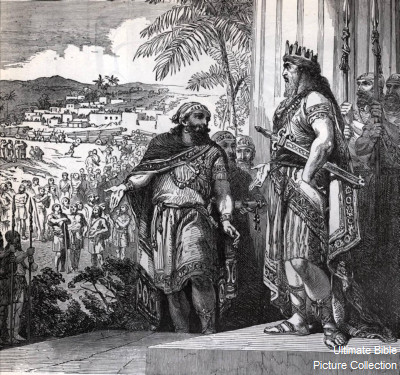As we enter the narrative offered in the books of the Kings, the nation of Israel is at the peak of its power and influence. By the end of the story, the children of God have become a captive people, living far from the land promised to Abraham, conquered by Joshua and ruled by David. Join us as we explore Israel’s decline and fall and God’s relationship with his rebellious children. During this series, we’ll consider the following:
- Session 1 - Solomon Takes Charge (1 Kings 1:1–2:46)
- Session 2 - Solomon the King (1 Kings 3:1–5:18)
- Session 3 - The Temple (1 Kings 6:1–8:66)
- Session 4 - The Glory and the Demise (1 Kings 9:1–11:43)
- Session 5 - A Hostile Divorce (1 Kings 12:1–14:20)
- Session 6 - Kings of Judah and Israel (1 Kings 14:21–16:34)
- Session 7 - Elijah and the Living God (1 Kings 17:1–19:21)
- Session 8 - The End of Ahab (1 Kings 20:1–22:40)
- Session 9 - Jehoshaphat, Ahaziah and Elisha (1 Kings 22:41–2 Kings 2:25)
- Session 10 - Elisha’s Life and Ministry (2 Kings 3:1–5:27)
- Session 11 - Elisha and the King (2 Kings 6:1–8:29)
- Session 12 - Jehu and Joash (2 Kings 9:1–12:21)
- Session 13 - The Dynasty of Jehu (2 Kings 13:1–15:7)
- Session 14 - The Fall of Israel (2 Kings 15:8–17:41)
- Session 15 - Hezekiah and Manasseh (2 Kings 18:1–21:26)
- Session 16 - The Josianic Reformation (2 Kings 22:1–23:30)
- Session 17 - The End (2 Kings 23:31–25:30)
During our second session, we discussed Solomon's kingship (1 Kings 3:1–5:18). Below is a recording of our discussion and the passage we discussed.
1 Kings 3:1–5:18 [New Revised Standard Version]
Solomon made a marriage alliance with Pharaoh king of Egypt; he took Pharaoh’s daughter and brought her into the city of David, until he had finished building his own house and the house of the Lord and the wall around Jerusalem. The people were sacrificing at the high places, however, because no house had yet been built for the name of the Lord. Solomon loved the Lord, walking in the statutes of his father David; only, he sacrificed and offered incense at the high places. The king went to Gibeon to sacrifice there, for that was the principal high place; Solomon used to offer a thousand burnt offerings on that altar.
At Gibeon the Lord appeared to Solomon in a dream by night; and God said, “Ask what I should give you.” And Solomon said, “You have shown great and steadfast love to your servant my father David, because he walked before you in faithfulness, in righteousness, and in uprightness of heart toward you; and you have kept for him this great and steadfast love, and have given him a son to sit on his throne today. And now, O Lord my God, you have made your servant king in place of my father David, although I am only a little child; I do not know how to go out or come in. And your servant is in the midst of the people whom you have chosen, a great people, so numerous they cannot be numbered or counted. Give your servant therefore an understanding mind to govern your people, able to discern between good and evil; for who can govern this your great people?” It pleased the Lord that Solomon had asked this. God said to him, “Because you have asked this, and have not asked for yourself long life or riches, or for the life of your enemies, but have asked for yourself understanding to discern what is right, I now do according to your word. Indeed I give you a wise and discerning mind; no one like you has been before you and no one like you shall arise after you. I give you also what you have not asked, both riches and honor all your life; no other king shall compare with you. If you will walk in my ways, keeping my statutes and my commandments, as your father David walked, then I will lengthen your life.” Then Solomon awoke; it had been a dream. He came to Jerusalem where he stood before the ark of the covenant of the Lord. He offered up burnt offerings and offerings of well-being, and provided a feast for all his servants.
Later, two women who were prostitutes came to the king and stood before him. The one woman said, “Please, my lord, this woman and I live in the same house; and I gave birth while she was in the house. Then on the third day after I gave birth, this woman also gave birth. We were together; there was no one else with us in the house, only the two of us were in the house. Then this woman’s son died in the night, because she lay on him. She got up in the middle of the night and took my son from beside me while your servant slept. She laid him at her breast, and laid her dead son at my breast. When I rose in the morning to nurse my son, I saw that he was dead; but when I looked at him closely in the morning, clearly it was not the son I had borne.” But the other woman said, “No, the living son is mine, and the dead son is yours.” The first said, “No, the dead son is yours, and the living son is mine.” So they argued before the king. Then the king said, “The one says, ‘This is my son that is alive, and your son is dead’; while the other says, ‘Not so! Your son is dead, and my son is the living one.’” So the king said, “Bring me a sword,” and they brought a sword before the king. The king said, “Divide the living boy in two; then give half to the one, and half to the other.” But the woman whose son was alive said to the king—because compassion for her son burned within her—“Please, my lord, give her the living boy; certainly do not kill him!” The other said, “It shall be neither mine nor yours; divide it.” Then the king responded: “Give the first woman the living boy; do not kill him. She is his mother.” All Israel heard of the judgment that the king had rendered; and they stood in awe of the king, because they perceived that the wisdom of God was in him, to execute justice.
King Solomon was king over all Israel, and these were his high officials: Azariah son of Zadok was the priest; Elihoreph and Ahijah sons of Shisha were secretaries; Jehoshaphat son of Ahilud was recorder; Benaiah son of Jehoiada was in command of the army; Zadok and Abiathar were priests; Azariah son of Nathan was over the officials; Zabud son of Nathan was priest and king’s friend; Ahishar was in charge of the palace; and Adoniram son of Abda was in charge of the forced labor. Solomon had twelve officials over all Israel, who provided food for the king and his household; each one had to make provision for one month in the year. These were their names: Ben-hur, in the hill country of Ephraim; Ben-deker, in Makaz, Shaalbim, Beth-shemesh, and Elon-beth-hanan; Ben-hesed, in Arubboth (to him belonged Socoh and all the land of Hepher); Ben-abinadab, in all Naphath-dor (he had Taphath, Solomon’s daughter, as his wife); Baana son of Ahilud, in Taanach, Megiddo, and all Beth-shean, which is beside Zarethan below Jezreel, and from Beth-shean to Abel-meholah, as far as the other side of Jokmeam; Ben-geber, in Ramoth-gilead (he had the villages of Jair son of Manasseh, which are in Gilead, and he had the region of Argob, which is in Bashan, sixty great cities with walls and bronze bars); Ahinadab son of Iddo, in Mahanaim; Ahimaaz, in Naphtali (he had taken Basemath, Solomon’s daughter, as his wife); Baana son of Hushai, in Asher and Bealoth; Jehoshaphat son of Paruah, in Issachar; Shimei son of Ela, in Benjamin; Geber son of Uri, in the land of Gilead, the country of King Sihon of the Amorites and of King Og of Bashan. And there was one official in the land of Judah.
Judah and Israel were as numerous as the sand by the sea; they ate and drank and were happy. Solomon was sovereign over all the kingdoms from the Euphrates to the land of the Philistines, even to the border of Egypt; they brought tribute and served Solomon all the days of his life. Solomon’s provision for one day was thirty cors of choice flour, and sixty cors of meal, ten fat oxen, and twenty pasture-fed cattle, one hundred sheep, besides deer, gazelles, roebucks, and fatted fowl. For he had dominion over all the region west of the Euphrates from Tiphsah to Gaza, over all the kings west of the Euphrates; and he had peace on all sides. During Solomon’s lifetime Judah and Israel lived in safety, from Dan even to Beer-sheba, all of them under their vines and fig trees. Solomon also had forty thousand stalls of horses for his chariots, and twelve thousand horsemen. Those officials supplied provisions for King Solomon and for all who came to King Solomon’s table, each one in his month; they let nothing be lacking. They also brought to the required place barley and straw for the horses and swift steeds, each according to his charge.
God gave Solomon very great wisdom, discernment, and breadth of understanding as vast as the sand on the seashore, so that Solomon’s wisdom surpassed the wisdom of all the people of the east, and all the wisdom of Egypt. He was wiser than anyone else, wiser than Ethan the Ezrahite, and Heman, Calcol, and Darda, children of Mahol; his fame spread throughout all the surrounding nations. He composed three thousand proverbs, and his songs numbered a thousand and five. He would speak of trees, from the cedar that is in the Lebanon to the hyssop that grows in the wall; he would speak of animals, and birds, and reptiles, and fish. People came from all the nations to hear the wisdom of Solomon; they came from all the kings of the earth who had heard of his wisdom.
Now King Hiram of Tyre sent his servants to Solomon, when he heard that they had anointed him king in place of his father; for Hiram had always been a friend to David. Solomon sent word to Hiram, saying, “You know that my father David could not build a house for the name of the Lord his God because of the warfare with which his enemies surrounded him, until the Lord put them under the soles of his feet. But now the Lord my God has given me rest on every side; there is neither adversary nor misfortune. So I intend to build a house for the name of the Lord my God, as the Lord said to my father David, ‘Your son, whom I will set on your throne in your place, shall build the house for my name.’ Therefore command that cedars from the Lebanon be cut for me. My servants will join your servants, and I will give you whatever wages you set for your servants; for you know that there is no one among us who knows how to cut timber like the Sidonians.” When Hiram heard the words of Solomon, he rejoiced greatly, and said, “Blessed be the Lord today, who has given to David a wise son to be over this great people.” Hiram sent word to Solomon, “I have heard the message that you have sent to me; I will fulfill all your needs in the matter of cedar and cypress timber. My servants shall bring it down to the sea from the Lebanon; I will make it into rafts to go by sea to the place you indicate. I will have them broken up there for you to take away. And you shall meet my needs by providing food for my household.” So Hiram supplied Solomon’s every need for timber of cedar and cypress. Solomon in turn gave Hiram twenty thousand cors of wheat as food for his household, and twenty cors of fine oil. Solomon gave this to Hiram year by year. So the Lord gave Solomon wisdom, as he promised him. There was peace between Hiram and Solomon; and the two of them made a treaty. King Solomon conscripted forced labor out of all Israel; the levy numbered thirty thousand men. He sent them to the Lebanon, ten thousand a month in shifts; they would be a month in the Lebanon and two months at home; Adoniram was in charge of the forced labor. Solomon also had seventy thousand laborers and eighty thousand stonecutters in the hill country, besides Solomon’s three thousand three hundred supervisors who were over the work, having charge of the people who did the work. At the king’s command, they quarried out great, costly stones in order to lay the foundation of the house with dressed stones. So Solomon’s builders and Hiram’s builders and the Giblites did the stonecutting and prepared the timber and the stone to build the house.
.jpg)






No comments:
Post a Comment